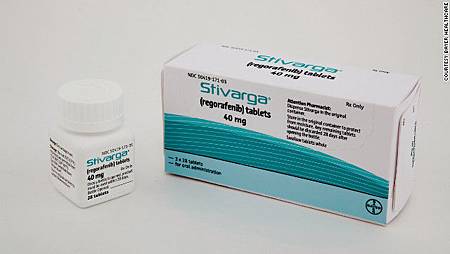
The US Food and Drug Administration (FDA) has approved the oral therapy regorafenib (Stivarga, Bayer) for the treatment of metastatic colorectal cancer.
Regorafenib is a novel multikinase inhibitor that blocks multiple enzymes that promote cancer growth.
"Stivarga is the latest colorectal cancer treatment to demonstrate an ability to extend patients' lives and is the second drug approved for patients with colorectal cancer in the past 2 months," said Richard Pazdur, MD, director of the Office of Hematology and Oncology Products in FDA's Center for Drug Evaluation and Research, in a press statement.
In August, aflibercept (Zaltrap; sanofi-aventis) was approved by the FDA for use in combination with FOLFIRI (folinic acid, fluorouracil, and irinotecan) chemotherapy.
Regorafenib is being approved with a boxed warning that indicates that severe and fatal liver toxicity occurred in patients treated with regorafenib during clinical studies.
In the drug's pivotal phase 3 randomized trial, known as CORRECT, median overall survival was 6.4 months in the regorafenib group and 5.0 months in the placebo group. This 29% increase in survival was originally presented at the 2012 Gastrointestinal Cancers Symposium, as reported by Medscape Medical News.
"This is the first small-molecule kinase inhibitor with proof of efficacy in metastatic colorectal cancer," said lead author Axel Grothey, MD, at a meeting press conference held in January. He is professor of oncology at the Mayo Clinic in Rochester, Minnesota.
Because the prespecified overall survival efficacy boundary was crossed at the second preplanned interim analysis, the study was unblinded to allow patients in the placebo group to cross over, Dr. Grothey explained.
In the CORRECT study, in addition to best standard care, 505 patients were randomized to oral regorafenib 160 mg (3 weeks on and 1 week off) and 255 were randomized to placebo.
Patients were to continue with the treatment until disease progression, death, or unacceptable toxicity.
In addition to improved overall survival, median progression-free survival was better with regorafenib than with placebo (2.0 vs 1.7 months). The estimated hazard ratio for progression-free survival was 0.493 (P < .000001).
There was also a substantial difference in disease control rate in the regorafenib and placebo groups (44% vs 15%; P < .000001).
The most frequent grade 3+ adverse events in the regorafenib group were hand–foot skin reaction (17%), fatigue (15%), diarrhea (8%), hyperbilirubinemia (8%), and hypertension (7%), Dr. Grothey reported.
Regorafenib was reviewed under the FDA priority review program. The designation provides an expedited 6-month review for drugs that offer major advances in treatment or that provide treatment when no adequate therapy exists, according to the agency.
Regorafenib has been approved 1 month ahead of the product's prescription drug user fee goal date.





 留言列表
留言列表
 線上藥物查詢
線上藥物查詢 